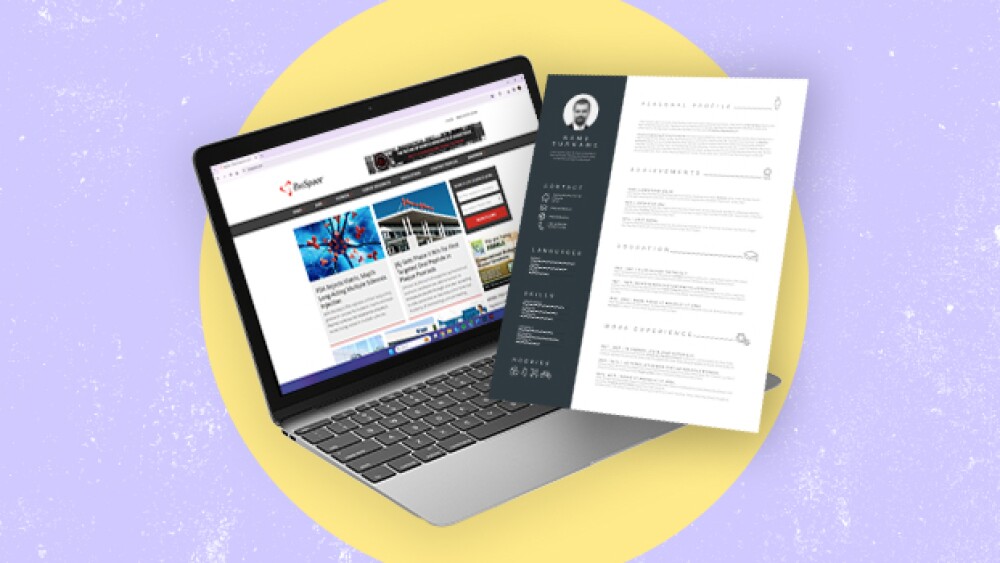Plus, tips on applying to multiple jobs at the same company, making new work friends, and how to ask for more time at the offer stage.
Pictured: Resume and laptop collage/Taylor Tieden for BioSpace
Welcome to Career Coach, a column for job seekers and employees navigating the ins and outs of finding, landing and succeeding in jobs in the biotech industry. Each month, Carina Clingman, founder of The Collaboratory Career Hub and host of the Biotech Career Coach Podcast, answers questions from the community. You can email her with questions at: hello@collaboratorycareerhub.com.
In this column, we explore the best approach for applying to several positions at the same company, making friends in a new job, and navigating simultaneous interview processes.
Q: How should I apply to multiple positions at the same company? I don’t want it to look like I’m applying to just any role, but several roles do interest me.
CC: That’s a great question, and I’m glad you asked because there is a specific way you should go about it. Most applicant tracking systems notice when you apply to multiple jobs and will flag it to the recruiter in some way. Sometimes, hiring managers can also see that applicants have applied to multiple roles, although they usually cannot see the details of roles they are not specifically hiring for.
To increase your chances of success, tailor your resume for each job individually and clearly communicate why you are interested in multiple positions. I recommend staggering your applications over several days and prioritizing applying to the job you are most excited about first.
When crafting your resume, it’s essential to write a strong headline statement that speaks directly to the job. This statement should not be an objective statement. In general, your headline should use the language from the job description and include part or all of the job title.
To identify “pain points” in a job description, carefully read and note any repeated or emphasized keywords. You may find it helpful to listen to a recent podcast episode I released that provides a step-by-step guide on how to dissect a job description to identify these pain points.
Let’s say you are applying for the position of “Senior Scientist, Cell Biology.” You notice that the job description emphasizes teamwork and related skills several times, and the first qualification listed is experience with complex cell culture systems and cancer biology. A strong example of a headline for your application would be:
“Collaborative and creative cancer cell biologist with specific expertise in designing, executing and teaching 2D and 3D tumor culture systems.”
Under the headline statement, create a highlights section with five strong bullet points that address the most important qualifications using action verbs such as developed, created, mentored or managed. Here’s one example bullet point:
- Developed and optimized seven primary tumor cell lines for use in 2D or 3D culture systems in collaboration with the preclinical development team.
Notice I used a specific number (seven), and I also managed to incorporate “collaboration” as a synonym for teamwork. A weaker version of this sentence that I often see on resumes looks something like: “Experience with 2D and 3D cell tumor culture.”
Q: I’m starting a new job and I’m deeply introverted. I’m really scared that I won’t make new friends or I’ve forgotten how.
CC: Hey there, fellow introvert, I see you! I can so deeply resonate with this question. Do you remember how easy it was to make friends when we were kids? It’s amazing to watch children effortlessly make connections with others. Let’s take a cue from our younger selves and try to approach social situations with the same openness and ease.
1. Starting a low-stakes conversation is a great way to engage with new colleagues. It is easier to initiate in person, but it can be done remotely as well. People love sharing their knowledge and recommendations, so you can leverage that by asking questions like, “Where is your favorite quiet place in the office to get some reading done?” For remote teams, you could ask, “Is there a Slack channel where people can share podcast and book recommendations?” Questions like these can take us back to our childhood days when we would simply walk up to someone and ask, “What’s your favorite ice cream?”
2. Being an introvert is an advantage because we are good listeners. As you hear (or overhear) things, take mental notes. For instance, if someone mentions that this weekend is their anniversary, or a colleague has to leave early for a kid’s soccer game, or another colleague didn’t come in today because they had to take a sick pet to the vet, make a note to follow up. You’ll quickly become known as the thoughtful and caring member of the team, and who doesn’t love that person?
3. One of my favorite networking tools can also help in making new friends at work. When I’m in a room full of strangers feeling awkward, I usually call it out. In a networking event, I might say something like, “Don’t you just love these awkward events? I’m Carina, by the way.” Similarly, in a new job, you could break the ice by saying, “First days are always a bit awkward, but I’d love to introduce myself. My name is Tanya, and I just started in the development group.” It might feel cringy, but it actually works! One of my friends once shared her daughter’s brilliant networking advice: “Just go up to them, and say, ‘Hi, my name is Allison, and my favorite color is pink.’ Then you’ll be best friends!”
It’s important to remember that you don’t have to become the most popular person in the office on your first day. If that’s your natural persona, that’s great. However, if you are more reserved and it takes time for you to build meaningful and deep connections, that’s perfectly fine too. Genuine friendships develop over time, but taking a few of these steps to get the ball rolling might just shorten the process a little bit.
Q: I am currently interviewing with multiple companies; however, the one I am most excited about is taking a long time to move forward with the process. I am in the final round of interviews for another company, but I am hesitant to accept a job offer from them just because their interview process was quicker.
CC: This is a very common situation, mainly because every company is going to have a different internal process for conducting interviews and also potentially a different sense of urgency for hiring. If you find yourself coming to the end of an interview process with Company A, but you really want to consider the opportunity with Company B objectively, you’ll need to have to have a conversation with one or both companies. Luckily, this is a common situation, and if you frame the conversation correctly, your recruiter will understand.
Let’s start with company A. If you are in the final stages of the interview process and you believe that the company is moving quickly toward making an offer, I recommend completing the final interview first. After that, if they ask for references and start the process of extending an offer, it may be appropriate to have a conversation with them. A good script for that discussion looks like:
“This process has been so enjoyable and efficient. Thank you so much for that! I’m very excited about the role, and I’m happy to provide my references and discuss offer details. I do want to be transparent that I am finishing up a few other interview processes, and it’s important that I fully consider each opportunity so that I make the best choice for both myself and the company I end up joining. I’ll try to hurry things along, but can you give me an extra 72 hours to bring things to a conclusion?”
In this example, you express your gratitude and enthusiasm, which is essential throughout the process. You are also framing the delay as something in the company’s best interest and giving a concrete deadline instead of asking for a nebulous amount of additional time.
For the slower company, company B, a good discussion script might look like:
“I’ve really been enjoying the interview process, and every interaction makes me more excited about the role. I’m feeling a bit of pressure because I’m in the final stages with another company, and I want to ensure that I have fully considered this position and can make the best choice for myself and the company I end up joining. Can you give me an idea of the timeline that your team will need to make a decision? I’ve asked the other company for an additional 72 hours. Would that work for your team? I certainly want to be fair to all parties and to myself.”
Here you’ll express gratitude and excitement, then make a reasonable time-bound request. Most recruiters are used to dealing with such requests and will work to expedite the process for candidates they are interested in.
If the process seems to be moving unreasonably slowly, and you like the offer from company A, you’ll need to consider the situation as a whole. Do you want to risk losing the other offer? If the company is moving that slowly, are they really interested in you? Ultimately, you may need to have an objective conversation with yourself or a trusted advisor.
Carina Clingman, Ph.D., is the founder of The Collaboratory Career Hub, an online community for people interested in working in biotech. She is also the founder and CEO of Recruitomics Consulting, which specializes in talent acquisition and talent strategy for startup biotechs. Listen to her new Biotech Career Coach Podcast, learn about joining the career hub here, or send questions to hello@collaboratorycareerhub.com.






